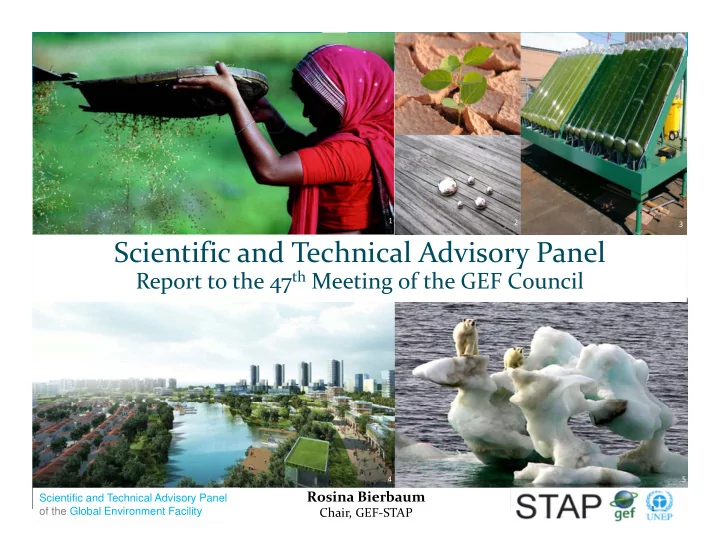

1 2 3 Scientific and Technical Advisory Panel Report to the 47 th Meeting of the GEF Council 4 5 Rosina Bierbaum Scientific and Technical Advisory Panel 1 of the Global Environment Facility Chair, GEF ‐ STAP
Rosina Bierbaum, Chair Brian Child, Sandra Diaz, Biodiversity Biodiversity Ralph Sims, CC Mitigation (former Panel Member) STAP Panel Members Ricardo Barra, Chemicals & Waste Annette Cowie, Land Degradation Anand Jakob Granit, International Patwardhan, CC Adaptation Waters 2
Outline of STAP’s Contributions Roles in GEF ‐ 6 GEF Project Cycle Work Program Integrated Approach Pilots Supporting Focal Areas Knowledge Management Emerging Global Environmental Issues Scientific and Technical Advisory Panel 3 of the Global Environment Facility
STAP’s Role in GEF ‐ 6 Support the GEF transition towards greater integration and impact. Initiate focus on a limited number of cross ‐ cutting strategic areas and initiatives. Encourage closer interaction of external scientific and practitioner communities. Continue to support demand driven knowledge products. 4
STAP’s Contribution to the GEF Project Cycle Continue to screen all full ‐ size projects at entry into the GEF project cycle ‐ rating as “Concur”, “Minor issues” or “Major issues”. Direct higher effort towards projects with significant components of science and innovation or with unique methodological issues. 5
Integrated Approach Pilots (IAPs) STAP will contribute to the IAPs primarily through: Ongoing support for program design including research needs. Development of indicators to measure success. Engagement with IAP technical advisory groups to support knowledge management and learning. 6
IAP – Taking Deforestation out of Commodity Supply Chains Components: Coordination, Production, Demand, Enabling transactions & intermediaries STAP’s role: Overall program design– review of documents Developing criteria for identifying and assessing the “right” areas for commodity production Generation of knowledge products 7
IAP – Sustainable Cities: Harnessing Local Action for Global Commons STAP’s role: Assess the results of the ISO 37120 20 city pilot with the Global Cities Initiative (GCI/WCCD). Assist in generating 5 ‐ 7 indices to track sustainability status (e.g., carbon footprint per capita per year). Assist in the design of projects to include testing of indices in selected pilot cities. 8
IAP – Sustainability and Resilience for Food Security in Sub ‐ Saharan Africa Objective : safeguarding ecosystem services for the long ‐ term sustainability and resilience of food production systems Relevant to: Managing land degradation Climate change mitigation and adaptation Biodiversity conservation Food security Sustaining livelihoods of the rural poor STAP’s role: Input on indicators for monitoring and assessment Identify needs and support strategic research e.g., scaling ‐ up approaches 9
Indicators of agro ‐ ecosystem resilience Process to identify indicators: Background papers • • Conceptual basis for resilience • Remotely ‐ sensed measures of land cover and productivity • Expert workshop, with input from Conventions Living sand barrier Contour Terrace
Agro ‐ ecosystem Resilience Indicators Inform Monitoring and Assessment for the IAP Complement the UNCCD progress indicators on land cover and productivity Relevant to UNFCCC as a measure of land ‐ based adaptation , and the CBD as a measure of ecosystem resilience Inform review of resource allocation and assessment for Land Degradation focal area of the GEF Encourage integrated strategies for natural resource management
Supporting Focal Areas Biodiversity PAs, Mainstreaming Chemicals and Waste Mercury Data Streamlining, POPs elimination, Green Chemistry Mitigation Black Carbon, Green House Gas Accounting Adaptation NAPs, M&E of adaptation investments International Waters Areas Beyond National Jurisdiction 12
Near ‐ term Knowledge Management tasks Data mining exercise of 100 completed GEF projects to develop typology of knowledge products, processes and technologies. Survey of knowledge management systems of GEF agencies to identify existing models & best practices. Propose incorporating KM outcomes into ongoing GEF IEO ‐ led country portfolio evaluations. STAP plans to present preliminary results at the GEF Council meeting in June 2015. 13
Exploring Knowledge Management Opportunities Learning from GEF ‐ 6 for GEF ‐ 7 Incorporate research and learning outcomes into IAPs Empower countries to be co ‐ owners of the GEF’s knowledge management efforts Encourage regional learning communities 14
Upcoming Workshops Agro ‐ ecosystem Resilience Indicators Sydney, Australia November 2014 Minamata Convention on Mercury Vancouver, Canada Pollution : Science for Successful November 2014 Implementation (STAP/SETAC Workshop) Mumbai, India Monitoring and Evaluation for Adaptation January 2015 (STAP/PROVIA Workshop) 7 6 15
Emerging Global Environmental Issues Enhance climate resilience of GEF interventions Environmental Security and Cooperation Source to Sea Green Chemistry 16
Questions and Comments Rosina Bierbaum Chair GEF STAP www.stapGEF.org 17
Recommend
More recommend